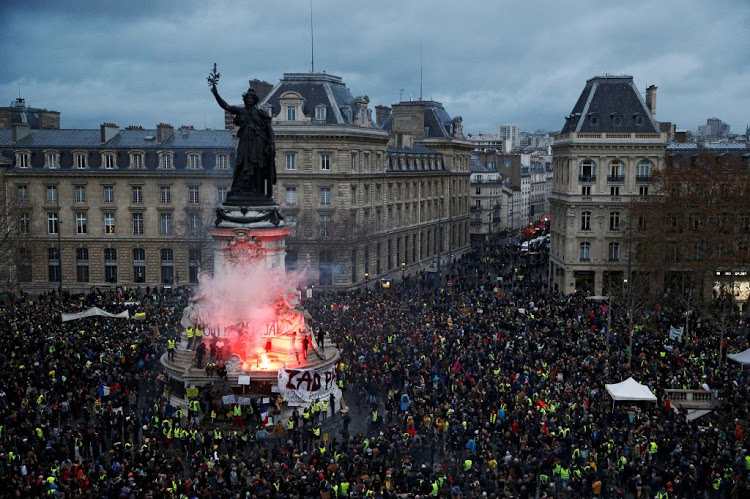By Clare Doyle, Committee for a Workers International (the international socialist organisation to which the Socialist Party in Ireland is affiliated)
For more than a month now, since 17 November, France has seen an apparently unstoppable revolt from below. A massive tide of very visible protest has swept the country, initially against a rise in the tax on diesel, but rapidly becoming a revolt of the oppressed against ‘the president of the rich’, Emmanuel Macron.
On the evening of 10 December, after a day of talks between business and union leaders with the government, this most unpopular of presidents broke his silence to address the nation and accepted he had “upset” people. Confirming the reversal of the fuel tax rise, he outlined a €10billion package which included a €100 rise in the minimum wage, a revision of levies on pensions, a decrease in taxation on overtime pay and encouragement for better-off bosses to pay a little Christmas bonus to their workers if they could afford it!
The top crocodile, Macron, shed some tears, but there was no talk of reversing the massive tax breaks given to the super-rich from the earliest days of his still short ‘reign’. A gilets jaunes representative, Laetitia Dewalle, invited for comment by the main state TV channel France2, exclaimed: “Of course it’s not enough!” She added, “If he’s been absent from view for ten days, it was obviously to take acting lessons.” “Why should I listen to him?” said someone watching the broadcast. “He doesn’t listen to us!”
The next day, Tuesday 11 December, has seen a new wave of protests, including fierce battles between police and protesters, with large numbers of students mobilised. A number of scenarios could open up.
Macron resign!
Together with his La Republique en Marche party, Macron has only been in power for 18 months. Variously styling himself as Jupiter or Napoleon, it is his resignation that every demonstration has been demanding. Some protesters are veterans of the month of revolution in 1968, when the fate of General de Gaulle hung in the balance. Others refer, light-heartedly, to the way Louis XVl met his end in the revolution of 1789!
This is not yet a revolution, but a very determined uprising of the neglected and deprived sections of the population, especially in the countryside. But more and more, it has found an echo amongst layers of France’s heroic working class.
The ‘invisible’ have become visible with the yellow ‘Hi Viz’ jackets – the uniform of the movement. Their good-natured blockades of the roads and toll booths across the country have become a novel, now well-established, feature of this revolt.
The diesel tax rise – a cheap way for this government to raise money and look as if it cares for the environment – was the last straw for so many in French society, who have seen their living standards pushed down to poverty levels. As the protests, which include people of all political persuasions and none, have grown, so have the demands. By the fourth week they were reported to have a charter of “suggestions to end this crisis”.
Under ‘Economy/work’, it speaks of a 40% increase in the minimum wage, pensions and benefits, of “mass hirings” in the state sector, of 5 million new homes.
Under the heading ‘Politics’, France should leave the EU, reverse all privatisations, remove all ‘useless’ speed cameras (!), reform education. Under ‘Health/Environment’ it demands a 10 year guarantee to end planned obsolence, ban GM foods, carcinogenic pesticides, monoculture and reindustrialise France to reduce pollution.
Under ‘Geopolitics’ they want to pull France out of NATO and foreign wars and stop plundering Francophone Africa…generally have laws and access to the law that covers everyone and everything!
Who is involved?
The protests have been joined by workers on the blockades and on the demonstrations in Paris and around the country. It has inspired workers and young people across the border in Belgium and elsewhere, who have had enough of austerity and pro-rich governments. The movement, especially if it gains a major victory, could well spread across Europe and beyond. Many workers and young people are envious of the French people’s penchant for exercising their constitutional right to riot! The Egyptian dictator, General Sisi, has banned the sale of yellow, hi-viz jackets and even Mosul in Iraq is reported to have its own small gilets jaunes protest.
Youth enter the fray
On 10 December, a new impetus was given to the ‘uprising’ when students at 100 schools set up blockades and joined the struggle. Students are angry at the so-called ‘reforms, which deny them unfettered access to university. Their entry onto the scene was undoubtedly a weighty factor behind the concessions made by Prime Minister, Phillippe, announced on Tuesday 11 December.
Then the shocking scenes went viral of school students on their knees, with their hands on their heads or tied behind them, and with fully armed police towering over them. This aroused a wave of anger beyond the borders of France. On many of the demonstrations, last Saturday, a theatrical re-enactment of armed police versus children was played out in the squares of the country’s towns and cities.
At first, the gilets jaunes were mostly impoverished middle and poor layers of the population, far from and alienated by what they saw as the pampered bourgeois of the capital city. When the Saturday demonstrations in Paris ended with violent battles and the torching of some symbols of luxurious living, demonstrators commented to the media: “We wouldn’t take this kind of action ourselves but we like the results!”
The plebeian nature of the original layers involved in this movement finds expression in their hostility to the complacently rich – the ‘BoBo’s or ‘bourgeois bohemians’ of Paris, and elsewhere – that they are alienated from. The president, who is seen as representing these people rather than those of the majority of the population, has sunk lower in the opinion polls than any previous president. He has less support than the 24% of the electorate which supported him in the first round of the 2017 presidential election.
His party is fractured, his government has already ‘lost’ seven ministers. He may sacrifice his prime minister, as other presidents have done in the face of revolt against their rule. Macron is desperate that it is not his own head that rolls.
Features of a revolution
The brutal use of the forces of the state against demonstrators, in many places, has only increased the determination of the protesters for a fight to the finish. The ruling layer in society is at sixes and sevens on how to proceed. The middle layers are already involved. The forces of the state have been overstretched and are ripe for defection.
What is missing is a mass mobilisation of the most powerful force in society for change – the working class in the factories, the depots, the stations, the offices, the schools and the hospitals. All these workers have already expressed grievances against their bosses or the government or both. Many have been involved in determined but scattered strikes and struggles.
The Committee for a Workers’ International (CWI) bases itself on the tenet that the only force that can lead to a decisive and lasting victory over the capitalist system is the working class, on the move and with a clear, revolutionary leadership. As yet these factors are missing.
The largest trade union federation in France – the CGT – belatedly called for a build-up of strikes and demonstrations from this Friday coming, and a general strike could develop, even without a call from the top, as it did in 1968. Alternatively it could be limited action but successful, like the mobilisation of two million public sector strikers on the streets in 1995, which defeated the pension ‘reforms’ of Jacques Chirac (and saw the resignation of his prime minister, Alain Juppe). The strategy (on either side) could be to allow a breathing space over the Christmas period before another round of battles in the New Year.
Whatever happens, it is clear that this battle with Macron and his rich backers is not over.
Jean-Luc Melenchon, leader of France Insoumise (France Unbowed), and the left candidate who got over 7 million votes in the first round of the last presidential election, called for protesters to converge in Paris and other cities for ‘Act 5’ of the Saturday demonstrations. He speaks of a continuation of the Citizens’ Revolution but makes no concrete proposals for organising a movement to carry it through.
Programme and leadership
The forces of the CWI in France – Gauche Revolutionnaire – and supporters from other countries, are active participants in the movement – on the blockades, in the lycees and on the mass protests. They have a special issue of their paper – ‘Egalite’ – which calls for a one-day general strike, as the next step to mobilise to bring down of the hated government.
The appetite has undoubtedly increased with the eating in an inspiring movement. It is diffuse, but the nature of the demands clearly reflect the anger that exists in society at searing levels of inequality – vastly increased wealth for the tops and ever-increasing sacrifices for the working class and poor.
A feature of this movement has been widespread comments of previously comfortable layers of the middle class now forced into the ranks of the working class. Marx and Engels explained exactly this process that takes place during crises of capitalism in the ‘Communist Manifesto’ first published 170 years ago. Similar moods and sentiments lie behind much of the growth of populism of both the right and left variety in other countries, along with the still surviving post-Stalinist hostility towards organising parties, the concerns of top-down policy-making. It means the movement is diffuse. Being leaderless is an advantage, in some respects, but a hindrance to democratic decision-making and development of cadres and leadership.
The far right figure, Marine le Pen, blamed globalisation and immigration for the crisis in French society. Some of the protests originally smacked of these sentiments but such views were crowded out by mood of common struggle against the government.
Now the gilets jaunes is truly a movement of ‘tous ensemble’ (‘everyone together’). The crucial element which can turn this massive cry of rage into a force for transforming society, on socialist lines, is a party that has this as its clear aim – not just in its name, devoid of all meaning, like that of the discredited Socialist Party in France. The Communist Party in France does not have the support of the past, when it was a mass party of the working class. But that also means it cannot play the role it did in 1968 of an enormous brake on the workers’ movement just as it was on the brink of taking power.
Socialist struggle
One of the features of the present movement is that it appears to have no leaders and so no-one that the government can persuade to call off the action. It has spokespeople, like Benjamin Cauchy, who declares the movement will not be satisfied with crumbs – it wants the baguette.
As socialists, we would say, why not the bakery? Macron may ‘sacrifice’ his prime minister. He may even be forced to resign himself. New elections may be called. But any government which stays in charge of an economy where the commanding heights are largely in the hands of private owners will return, again and again, to make the workers and poor pay for their recurrent crises.
‘Now that you feel your power’, we would say, ‘Why not link up representative elected committees on a local, regional and national level and make a bid to get rid of the government?’ Jean-Luc Melenchon has called for a Constituent Assembly. Why not make it an assembly of revolt, with democratically elected representatives, at all levels, including from assemblies in the workplaces , offices, schools, local neighbourhoods, and factories?
Such mass committees of struggle could grow into a government of workers and poor people. It can have as its programme all the demands of the movement and the taking into public ownership of the big banks and top companies – the ‘CAC 40’ – which form the basis of French capitalism (and where the friends of Macron get their easy wealth from). The watchwords of the revolution of 1789 – ‘Equality, Liberty and Fraternity’ – can only be secured on the basis of socialism!
As the special edition of Gauche Revolutionnaire’s newspaper puts it, the French movement needs to link the immediate struggle for a minimum wage, the re-instatement of the taxes on the super-rich, an injection of billions into education, health and the environment with the struggle for socialism. This entails striving for a society that is “planned democratically and ecologically to satisfy the needs of all and not the profits of the handful of super-rich…a truly democratic, fraternal and tolerant society, free of wars, poverty, racism and sexism”.












